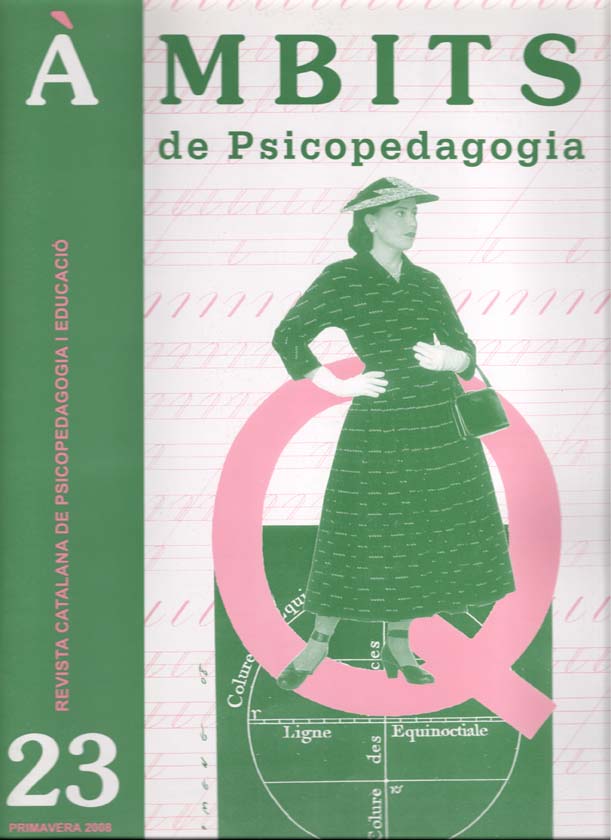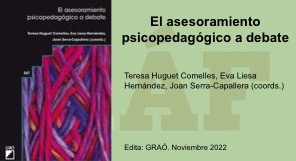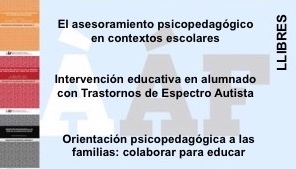El apoyo conductual positivo. Una perspectiva para el tratamiento de las conductas problemáticas
Resumen
Las escuelas tienen que hacer frente, cada vez más, a determinadas conductas problemáticas que presentan algunos alumnos. Tradicionalmente, el tratamiento de estas conductas se ha centrado en su disminución. Sin embargo, la percepción actual que se tiene de estas conductas exige nuevos planteamientos. El Apoyo Conductual Positivo representa una perspectiva diferente para el tratamiento de las conductas problemáticas en la escuela. Es un enfoque esencialmente educativo, sistémico, proactivo y positivo. El objetivo de este artículo es presentar lo que se entiende por apoyo conductual positivo, sus características principales y los componentes que lo definen.
Citas
Bambara, L. i Knoster, T. (1998). Designing positive behavior supports plans. Washington: American Association on Mental Retardation.
Crone, D. i Horner. R. (2003). Building positive behavior support systems in schools. Functional behavioral assessment. New York: The Guilford Press.
Crone, D., Horner, R. i Hawken, L. (2004). Responding to problem behavior in schools. The Behavior education program. New York: The Guilford Press.
Dunlap, G. i Carr, E.G. (2007). Positive behavior support and developmental disabilities: a summary and analysis of research. Dins S.L. Odom, R. Horner, M. Snell i J. Blacher (editors), Handbook of developmental disabilities. New York: The Guilford Press.
Dyson, A. (2001). Special needs in the twenty-first century: where we’ve and where we’re going. British Journal of Special Education, 28 (1), 24-29.
Font, J. (2001). El suport conductual positiu: un model d’intervenció pel tractament de les conductes problemàtiques. Suports, 5 (1), 44-54.
Haager, D., Klingner, J. i Vaughn, S. (2007). Evidence-based reading practices for response to intervention. Baltimore: Paul H Brookes.
Horner, R., Sugai, G., Todd, A. i Lewis-Palmer, T. (2005). Schoolwide positive behavior support. Dins L. Bambara i L. Kern, Individualized Supports for students with problem behavior. New York: The Guilford Press.
Jackson, L. i Veeneman Panyan, M. (2002). Positive behavioral support in the classroom. Principle and practices. Baltimore: Paul H Brookes.
Lewis, T. i Sugai, G. (1999). Effective behavior support: A systems approach to proactive schoolwide management. Focus on Exceptional Children,
Norwich, (2007). Dilemmas of inclusion and the future of education. En R. Cigman (Ed.), Included or excluded? The challenge of the mainstream for some SEN children (pp., 69-84). London: Routledge.
Preciado, J. i Sugai, G. (2004). Suport conductual positiu a nivell d’escola: una revisió de les seves característiques crítiques. Suports, 8 (2), 148-156.
Preciado, J. i Sugai, G, (2007). Donar suport a l’alumnat amb problemes conductuals des d’un enfocament centrat en la funció. Suports, 11 (1), 4-11.
Schalock, R. (2006). Resultats personals per als alumnes amb discapacitat intel·lectual. Suports, 10 (2), 60-65.
Sugai, G., Horner, R.H., Dunlap, G, Hieneman, M., Lewis, T.J., Nelson, C.M, Scott, T., Liaupsin, C., Sailor, W., Turnbull, A.P., Turnbull, H.R., Wickham, D. Wilcox, B i Ruef, M. (2000). Applying positive behavior support and functional behavioral assessment in schools. Journal of Positive Behavior Interventions, vol. 2, nº 3, 131-143.
Sugai, G., Horner, R,H. i Sprague, J.F, (1999). Functional-assessment-based behavior support planning: Research to practice to research. Behavioral Disorders, vol. 24, nº 3, 253-257.
Warnock, M. (2005). Special educational needs: a new look. Londres: Philosophy and Education Society of Great Britain.
Descargas
Publicado
Número
Sección
Licencia
Los autores/as conservan los derechos de autor y conceden a la revista el derecho de primera publicación de la obra, registrada bajo una licencia Creative Commons Reconeixement-NoComercial-Sense Obra Derivada. Esta licencia permite la descarga de las obras y que se puedan compartir con otros siempre que se reconozca la autoría, pero no permite que se modifiquen de ninguna forma ni ser utilizadas con finalidad comercial.















